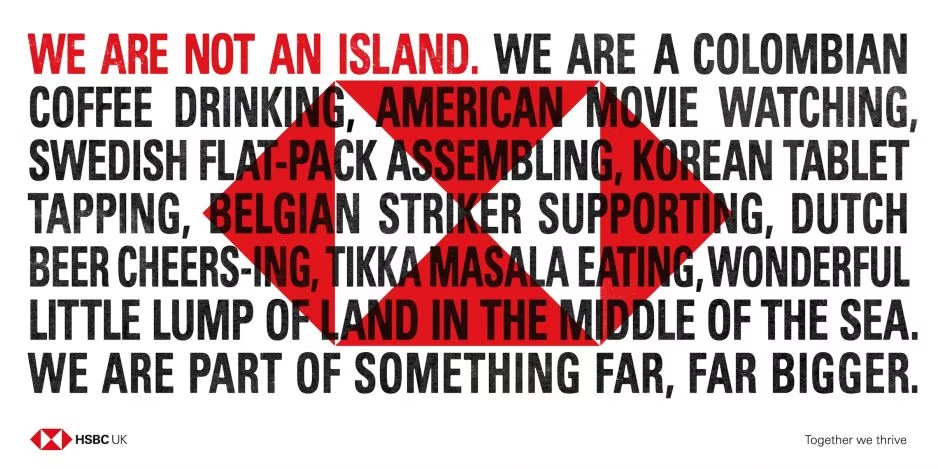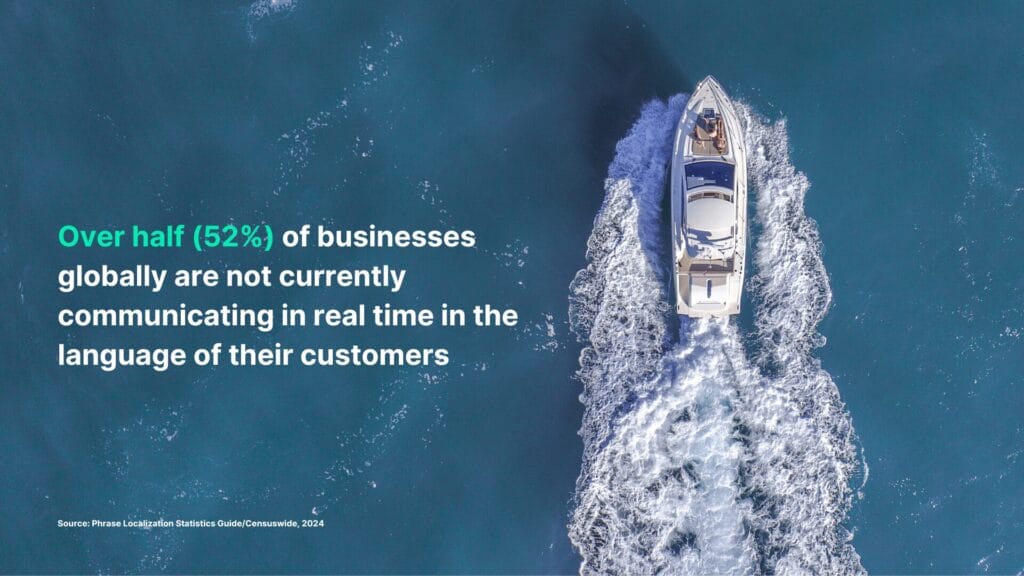A busy subway train. An exhausted Japanese commuter gently nods off on the train while the TV voice-over explains: “In some Asian countries, it is acceptable to fall asleep onto the shoulder of a stranger…in New York, it’s quite a different story.”
This advert was part of a brilliant campaign by HSBC through the 2000s that emphasized the importance of local knowledge across diverse markets, reiterating that regional culture and customer preferences are business critical.

The powerful brand story setting up HSBC as “The World’s Local Bank” generated almost $70b of incremental value between 2002 and 2008.
Culture shapes many of our everyday norms and etiquette: in some countries, such as Japan, finishing your meal is a sign of politeness, whereas leaving a little food on your plate in China signals to your host that they’ve been generous with their hospitality. Similarly, burping is considered rude in Europe but a sign that you’ve enjoyed your meal in India, Turkey, or China.
The primary focus of HSBC’s campaign was building authentic business relationships around the globe. Authenticity and trust are essential for business because customers prefer to buy from brands they connect with.
And when things go wrong, an engaging customer service experience is often the critical juncture at which brands can win back a potentially lost customer.
While being personable and connected is important, customer service is about more than just language—it’s about cultural understanding to foster authentic conversations.
Connection, authenticity, and trust are paramount for brand reputation, as retailers discovered when outsourcing customer services to foreign countries. In the early 2000s, companies often redirected customer service calls to a busy office in Bangalore, the hub of India’s rapidly growing IT industry.
To preserve authenticity, Indian staff adopted “English”-sounding names, minimized their accents, and undertook courses to understand Britishness. Cultural training included watching episodes of Yes, Prime Minister and Premier League football games should a UK-based customer reference David Beckham, talk about last night’s Eastenders, or mention the Royal family.
It was no surprise that Eastenders, Coronation Street, and Emmerdale proved to be a treasure trove of insight; many language learners often struggle with the nuances of UK slang, so British soaps are a good starting point to master English conversational skills.
In 2024, the customer service and call center industry looks a lot different from 2001; far less reliant on human customer service agents due to the rapid growth of generative AI, which has the potential to revolutionize customer operations and improve the customer experience.
A 2023 McKinsey report looking at the economic potential of AI technology highlights the case of one company with 5,000 customer service agents.
The application of GenAI increased issue resolution by 14% an hour and reduced the time for issue-handling by 9%. Furthermore, the AI assistant improved the productivity and quality of customer service, particularly among less-experienced customer service staff.
Additionally, consumer satisfaction and resolution are less dependent on a voice on the end of a phone. AI-powered technology, such as chatbots, can provide personalized responses automatically, leaving human customer service agents to focus on high-level, complex inquiries.
In this post, we take a closer look at companies prioritizing multilingual, localized customer service, and we focus on how personalization can create engaging customer experiences to drive long-term loyalty.
Personalization drives better business outcomes, fuels retention and customer loyalty
Customers expect individualized customer experiences at every touchpoint, and personalization drives better business outcomes. Research from consulting firm McKinsey shows that fast-growing companies derive 40% of their revenue from personalization.
Almost a third (31%) of customers expect personalized interactions, and 76% feel frustrated when their customer experience is not personalized.
As well as increasing productivity, technology makes it easier for brands to employ a hyper-localized approach and adapt to the cultural nuances of several regions and multiple locales.
In an increasingly globalized world, the application of multilingual customer service goes beyond just market expansion; it is also essential for customer acquisition in home markets that are increasingly multilingual.
American citizens speak an estimated 350 languages, while in New Zealand, government statistics estimate high growth in the local Chinese population. Multilingual CX is the bedrock of personalization, as communicating in their lingua franca is the most basic way to get closer to your customers.
Despite the deep-rooted benefits of multilingual support and personalization, many businesses have yet to adapt to customer expectations. A research conducted by Censuswide showed that over half (52%) of businesses globally don’t communicate in real-time in the language of their customers.

In a study by Censuswide, over half of the respondents reported that translation positively impacts business growth (55%), marketing communications (51%), and customer trust (53%).
However, Censuswide’s analysis also showed that over half (61%) of organizations globally and over two-thirds (67%) in Europe neglect to use AI to deliver a personalized approach through every customer touchpoint.
Brands that fail to adapt will lose out on winning new customers and risk high customer churn; almost 70% of customers would switch to a different brand that offers a well-rounded customer experience in their native language.
1. IndiGo expand market by personalizing customer service
Markets with multiple languages, regional dialects, and different cultures add complexity to CX personalization, particularly for delivering an efficient and rapid go-to-market strategy.
In 2019, low-cost airline IndiGo targeted eight Indian languages in its customer outreach program. Communicating with first-time flyers in their native language naturally results in greater reach and retention and drives growth.
With GenAII-powered real-time translations, brands can deploy effective multilingual customer service with fewer barriers and processes, such as hiring multilingual staff. Businesses can hyper-localize CX for linguistic efficiency and cultural relevance, resulting in highly effective and personalized customer service at a fraction of the cost.
2. Vodafone New Zealand launch CX platform for Chinese customers
Beyond market expansion alone, launching a dedicated service for different customer segments in your home market provides a strategic advantage to outpace your competitors.
In 2017, recognizing its growing base of Chinese Kiwis, Vodafone New Zealand launched Red Connect, a dedicated service for Chinese customers. Delina Shields, Vodafone’s Head of Segment Marketing, reported that investing in cultural adaptation is part of an overarching culture of customer-centricity:
“We’re committed to providing a service that recognizes their needs. That includes providing dedicated teams who speak Mandarin or Cantonese but also have a deep-seated understanding of Chinese culture and values,”
– Delina Shields, Vodafone’s Head of Segment Marketing
Vodafone employed the services of a Chinese digital agency to monitor social media trends and proactively respond to customer needs in real-time to provide a highly personalized, individualized customer experience.
Utilizing the social media platform WeChat, Vodafone delivered bespoke content to Chinese-speaking consumers, including product information, how-to guides, and Chinese-subtitled videos.
Using multilingual customer-focused content, the telecommunications company aimed to enhance user-experience and improve access for Southeast Asian users.
Shields further emphasized the need for Vodafone to provide a seamless customer experience as well as the impact of the speed of resolution on loyalty and retention:
“When people call our customer services team, they expect us to resolve their query as quickly and painlessly as possible.
By removing the language barrier for our Chinese-speaking customers, we aim to make their interaction with us seamless and enjoyable – it’s all about improving the customer experience and building the relationship”
Instilling a culture of strategic localization across all touchpoints proved fruitful, enabling Vodafone to reap long-term customer loyalty. Despite the wins, implementation can be costly, labor-intensive, and time-consuming.
However, with generative AI and localization-focused technology, customer service teams can simplify the implementation process and streamline workflows to achieve economies of scale that unlock growth with greater efficiency.
In the APAC region, hyper-localization and understanding lingual and cultural differences are critical for success; in mainland China alone, eight primary dialects are spoken, with different geographical areas of the country speaking different regional dialects.
3. Booking.com streamline customer support with generative AI
In the travel and hospitality industry, localization is a strategic imperative; conversing in multiple languages is crucial for hiring customer support staff.
The travel website Booking.com found that its customers prefer to communicate in their native language. The travel giant has 6,0000 customer service employees who speak English and another language, paying staff more for each additional language.
Beyond language alone, Booking.com strives to ensure its staff in its customer support call centers understand the cultural nuances and differences between various global regions.
The hospitality industry thrives on building meaningful customer interactions and deepening long-lasting customer relationships.
Traditionally, Booking.com has favored human-powered translation over machine translation. But with advanced technology, such as sophisticated AI Chatbots, CX teams can reduce reliance on manual processes by automating conversations, providing instant answers, and speeding up resolution with greater efficiency. Automation frees human customer service agents to focus on a more people-centric service when required.
4. GrandStay Hotels utilize AI chatbots to superpower customer service
Automated solutions can speed up customer communication so that customers can resolve issues without additional assistance.
GrandStay Hotels implemented AI Chatbots across its communication channels and automated repetitive inquiries.
The chatbots helped to achieve a 28% reduction in average handle time for calls, a 55% decrease in call abandonment rate, and a 15% improvement in first-call resolution.
5. Zendesk partner with Phrase and embrace AI to unlock successful, engaging customer experiences

The cloud-based customer service platform Zendesk partnered with Phrase to achieve global localization at scale.
With fast growth and rapid expansion, Zendesk found it increasingly untenable to rely on manual processes. A partnership with Phrase empowered the customer services leader to scale its rapid growth.
By accessing Phrase’s extensive analytics, Zendesk could make better-informed decisions and improve localization, resulting in greater efficiency and quality while maintaining cost-effectiveness.
Scaling customer support efficiently is essential when expanding into new markets. Automation powered by platforms like Phrase integrates seamlessly with customer support systems, enabling your team to assist customers in any language—without adding headcount.
From support tickets to help center articles and live chats, responses are translated instantly, ensuring exceptional service at scale.
There’s no doubt that cultural relevance is critical for global companies that put customers at the heart of their business, and embracing cultural sensitivity is essential for successful international customer service.
Building a customer-centric culture is a pillar of success for unlocking the full potential of customer experience. Moreover, global industries with a high volume of time-sensitive global customer inquiries achieve customer excellence by utilizing AI-powered localization platforms that provide quick, efficient, and timely localized international support, respond to customer requests, and resolve issues to form engaging customer experiences.
Ready to get started?
Reach a wider audience and build deeper connections today.






